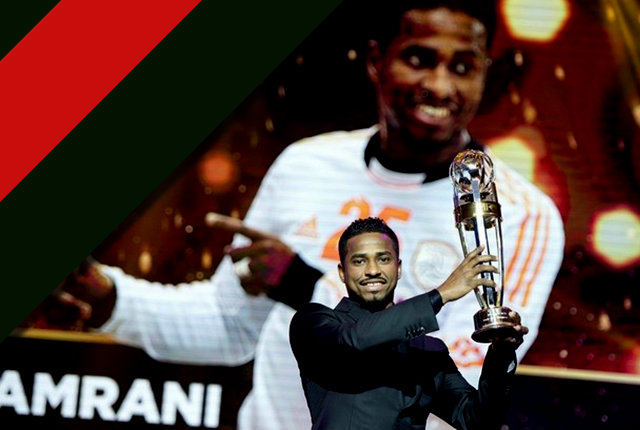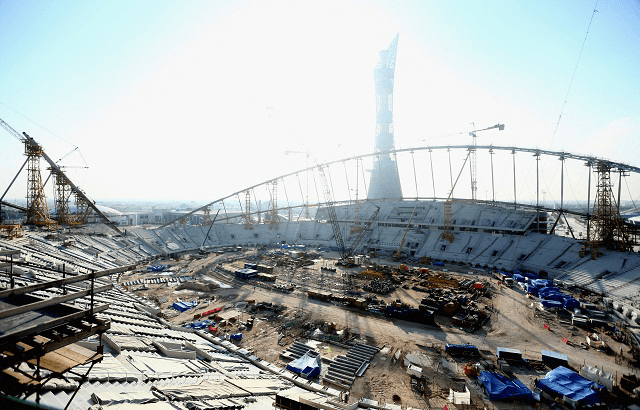A brand new feature on this website is the introduction of weekly & fortnightly columns focusing on various leagues, countries and regions across the World. Wael Jabir here documents the latest talking points in Middle East football.

Spitting Al-Shamrani, Suarez of Arabia?
The curtain fell on the Asian Football season on Sunday night with the AFC Annual Awards ceremony in The Philippines which saw Saudi Arabia & Al-Hilal striker Nasser Al-Shamrani crowned Asian Player of the Year, a choice that sparked hot debate across the continent. For all his talents and goalscoring exploits with Al-Hilal (second highest topscorer in the Champions League with 10 goals), Al-Shamrani is a controversial figure, the 31-year-old landed himself on hot water after spitting on an opposition player during the return leg of the Asian Champions League final against Western Sydney Wanderers. The incident enraged the Australian fans and even some Al-Hilal’s own fans who were extremely disappointed with Al-Shamrani’s dismal goalless performance across the 2 legged final and saw the incident as an archetype of his Dr Jekyll and Mr Hyde nature.
When the 3-man-shortlist for the award was announced earlier in November, there were many question marks, of which the inclusion of Nasser Al-Shamrani was the least. The other two candidates were even more baffling choices than Al-Shamrani. Al-Ain Emirati defender Ismael Ahmed & Al-Sadd Qatari attacker (and 2006 award winner) Khalfan Ibrahim were anything but expected picks. While Ismael’s ability at the back is admirable, he is far from even being player of the year in his country. One of the key players behind Al-Ain’s run to the Champions League semi-final is Omar Abdulrahman,the diminutive playmaker was one of the best performers throughout 2014 for both club & country and is definitely a more worthy nominee.
The case of Khalfan Ibrahim is an even more curious one, the son of a Qatari football legend in the eighties, he is one of the brightest talents to emerge from the Gulf state in recent years. That being said, Khalfan is no stranger to controversies, he was at the centre of a major one when he was named winner of this very same award back in 2006. At the tender age of 18 and having only featured in a handful of games for Al-Sadd & the national team, many found no better explanation for his selection for the award than the fact he is a close relative of non-other than the would-be infamous Mohammed Bin Hammam, then the AFC President.
On the contrary, Australian Goalkeeper Ante Covic who led his Western Sydney Wanderers to Champions League triumph, in the process producing a series of phenomenal saves, most notably in the final in Riyadh, would have been a much more suitable nomination having already been named The Champions League’s Player of the Tournament.
The eventual winner, Nasser Al-Shamrani, might after all be a worthy winner of the award, but scepticism continues to surround the AFC and its awards and this shortlist has done nothing to distant the confederation from accusation of corruption and, at best, bias towards its key markets. The 8 matches ban handed to Al-Shamrani could just serve to calm the critics who argued he should have never won the award with such lack ofsportsmanship. Just like FIFA did with a certain biting Uruguayan striker.
Are Qatar genuine Asian Cup contenders?
It is all about Qatar nowadays in Asian & Middle Eastern football. The often maligned 2022 World Cup hosts have over the past month won the U-19 AFC Asian Cup in Myanmar and the 22nd Gulf Cup in Saudi Arabia. But will they be a worthy bet to add to their trophy haul come January’s continental competition in Australia?
The young Qataris went to Myanmar with a squad made of 14 Europe based players out of their 22-man squad, an unprecedented feat for a Gulf nation. An unbeaten run to the trophy saw them beat the likes of China and hosts Myanmar before edging out North Korea in the final courtesy of a second half goal from Akram Afif. Like all his teammates, Akram is a graduate of the Doha based Aspire Academy. He now plies his trade with the Juvenile A team of Spanish side Sevilla FC. The strategy of developing players in local academies then sending them to play for youth sides in Spain, Belgium or The Netherlands is one shared by the two Asian nations of Qatar & North Korea and seems to be bearing fruits as North Korea won the most recent U-16 Asian Cup and finished second in both U-14 and U-19 while Qatar won the latter.
Victory in the Gulf Cup followed, and the senior team, a mix of Aspire graduates like Abdelkarim Hassan, naturalized North African talents like Khoukhi and Boudiaf and veterans like Captain Wesam Rizik. Despite a slow start to the tournament and only making it past the group stage with 3 points, the team rose up to the challenge and the efforts of manager Djamel Belmadi were rewarded with a 2-1 victory over the hosts in the final to lift the trophy for the third time in their history.
When the AFC Asian Cup kicks-off in just over a month’s time, coach Belmadi and his team will have their eyes set on a spot in the semi-finals. But to get there, they will first need to overcome fellow Gulf Cup contenders Bahrain and the UAE alongside a strong Iran side to top the group. Topping the group would itself be a difficult target, but it will mean they get to avoid facing favourites Japan in the quarter-final and instead play Iraq or perhaps Jordan. Recent successes will give the Qataris the confidence to go far in Australia and it remains to be seen whether Belmadi sticks to his Gulf Cup squad or if some of the youngsters from the U-19 team get to book a place in the flight heading down under. A certain boost for the team will be the recovery of 2014 Asian Player of The Year nominee Khalfan Ibrahim who could well lead the line to help Qatar into their best ever Asian Cup finish.
Talent Radar Player of the Week
The Talent Radar player of the week comes once again from the Gulf Cup. Qatari left back Abdulkarim Hassan starred in his country’s run to be crowned 2014 Gulf Cup champions. The Aspire Academy graduate was ever present and made a solid contributionto the final, intercepting attacks and limiting Salem Al-Dossary’s impact from the right wing of the Saudi attack while also running up the flank making crosses whenever the opportunity arises.
Abdulkarim may be one of the few Aspire graduates who have stayed in Qatar but the way his career is panning out with Al-Sadd, he is certainly set to become a cornerstone for the Qatari national team, not just in the Asian Cup but for years to come and a move to Europe may yet beckon for him.
Written by Wael Jabir
- Middle East Column: Spitting Al-Shamrani, Suarez of Arabia? - December 3, 2014
- Middle East Football Column: Sami Al-Jaber, greatest of all time? - November 26, 2014
- Why Saudi Arabia need to win the 2014 Gulf Cup - November 19, 2014
























































